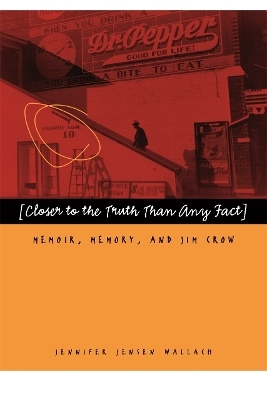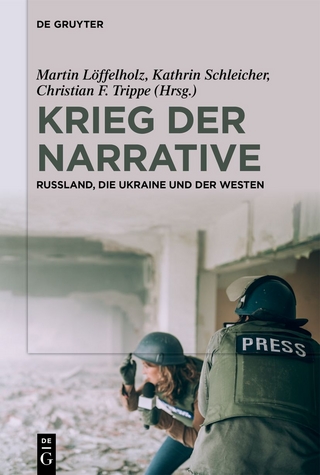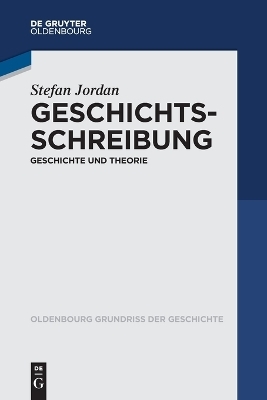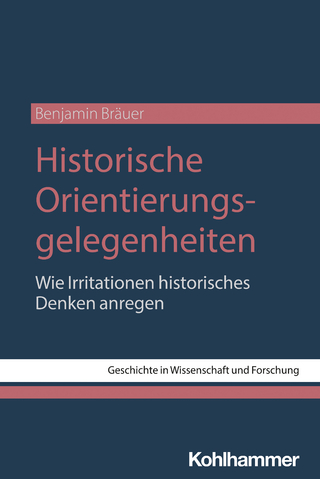
Closer to the Truth Than Any Fact
Memoir, Memory, and Jim Crow
Seiten
2008
University of Georgia Press (Verlag)
978-0-8203-3069-3 (ISBN)
University of Georgia Press (Verlag)
978-0-8203-3069-3 (ISBN)
Argues that the field of autobiography studies, which is dominated by literary critics, needs a theoretical framework that allows historians, too, to benefit from the interpretation of life writing.
How should historians use autobiography?Although historians frequently use memoirs as source material, too often they confine such usage to the anecdotal, and there is little methodological literature regarding the genre's possibilities and limitations. This study articulates an approach to using memoirs as instruments of historical understanding. Jennifer Jensen Wallach applies these principles to a body of memoirs about life in the American South during Jim Crow segregation, including works by Zora Neale Hurston, Willie Morris, Lillian Smith, Henry Louis Gates Jr., William Alexander Percy, and Richard Wright.Wallach argues that the field of autobiography studies, which is currently dominated by literary critics, needs a new theoretical framework that allows historians, too, to benefit from the interpretation of life writing. Her most provocative claim is that, due to the aesthetic power of literary language, skilled creative writers are uniquely positioned to capture the complexities of another time and another place. Through techniques such as metaphor and irony, memoirists collectively give their readers an empathetic understanding of life during the era of segregation. Although these reminiscences bear certain similarities, it becomes clear that the South as it was remembered by each is hardly the same place.
How should historians use autobiography?Although historians frequently use memoirs as source material, too often they confine such usage to the anecdotal, and there is little methodological literature regarding the genre's possibilities and limitations. This study articulates an approach to using memoirs as instruments of historical understanding. Jennifer Jensen Wallach applies these principles to a body of memoirs about life in the American South during Jim Crow segregation, including works by Zora Neale Hurston, Willie Morris, Lillian Smith, Henry Louis Gates Jr., William Alexander Percy, and Richard Wright.Wallach argues that the field of autobiography studies, which is currently dominated by literary critics, needs a new theoretical framework that allows historians, too, to benefit from the interpretation of life writing. Her most provocative claim is that, due to the aesthetic power of literary language, skilled creative writers are uniquely positioned to capture the complexities of another time and another place. Through techniques such as metaphor and irony, memoirists collectively give their readers an empathetic understanding of life during the era of segregation. Although these reminiscences bear certain similarities, it becomes clear that the South as it was remembered by each is hardly the same place.
JENNIFER JENSEN WALLACH is an assistant professor of history at Georgia College and State University. She has also taught at Stonehill College.
| Erscheint lt. Verlag | 30.8.2008 |
|---|---|
| Verlagsort | Georgia |
| Sprache | englisch |
| Gewicht | 445 g |
| Themenwelt | Geisteswissenschaften ► Geschichte ► Geschichtstheorie / Historik |
| Geisteswissenschaften ► Sprach- / Literaturwissenschaft ► Anglistik / Amerikanistik | |
| Geisteswissenschaften ► Sprach- / Literaturwissenschaft ► Literaturwissenschaft | |
| ISBN-10 | 0-8203-3069-8 / 0820330698 |
| ISBN-13 | 978-0-8203-3069-3 / 9780820330693 |
| Zustand | Neuware |
| Haben Sie eine Frage zum Produkt? |
Mehr entdecken
aus dem Bereich
aus dem Bereich
Russland, die Ukraine und der Westen
Buch | Softcover (2024)
De Gruyter (Verlag)
39,95 €
Geschichte und Theorie
Buch | Softcover (2024)
De Gruyter Oldenbourg (Verlag)
24,95 €
wie Irritationen historisches Denken anregen
Buch | Softcover (2024)
Kohlhammer (Verlag)
69,00 €


